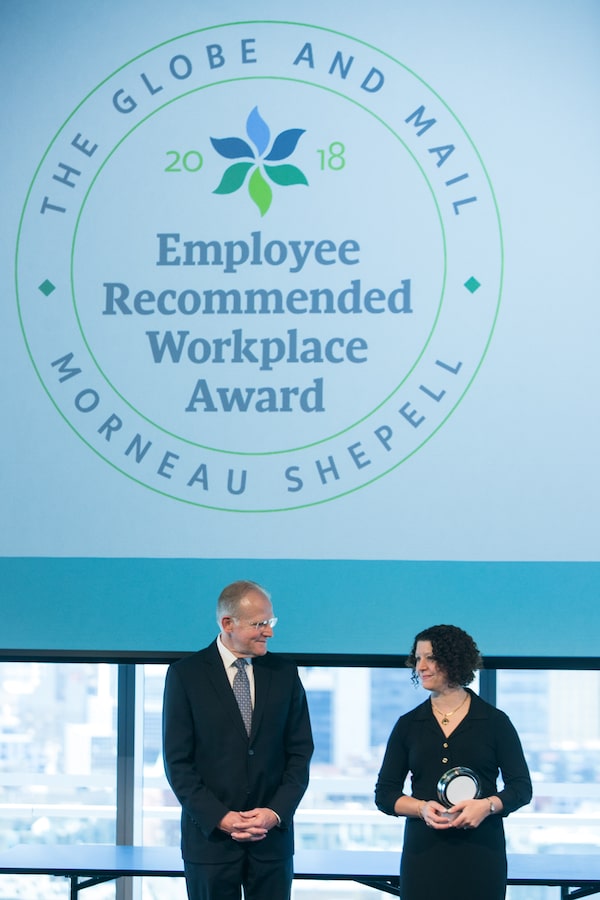The Globe and Mail and Morneau Shepell have created the Employee Recommended Workplace Award to honour companies that put the health and well-being of their employees first. Read about the 2018 winners of the award at tgam.ca/workplaceaward.
Registration for the 2019 Employee Recommended Workplace Awards is open at www.employeerecommended.com.

Randal Phillips from Morneau Shepell and Gillian Livingston from The Globe and Mail prepare to hand out trophies to the Top Category winners for the 2018 Employee Recommended Workplace Award.Glen Lowson
What is one of your most important assets that predicts your organization’s success?
Interestingly, many leaders reply, “Our people.” However, how many workforces truly believe that their leadership values them? How many organizations are engaging their workforce and demonstrating the behaviour that convinces employees they’re valued? How many employers are measuring not only what people are saying but how they are doing with respect to their health, engagement and productivity?
It was that line of questioning that set the stage for the Employee Recommended Workplace Award (ERWA), the workplace award jointly created by The Globe and Mail and Morneau Shepell. As we pondered such questions, we took the position that employer behaviours are not the only factors that predict people’s success. It also depends on what employees are willing to do to help themselves. This two-way accountability model was a foundational piece for the award’s design.
Our goal was to create a new employee recognition award that showed both new and current employees which employers truly value them. We decided early on that we didn’t want the ERWA to be the same as most recognition awards that base winners on what employers do and what employees think of their efforts.
We decided to take a risk and create the first evidence-based employee recognition award in Canada, where winners are decided by employees’ total health score.
Each organization’s total health score is defined by its workforce’s aggregated total health score – the sum of four pillars: physical (lifestyle choices, physical, nutrition and sleep), mental (general mental health, coping skills), workplace experience (stress, engagement, psychosocial safety) and life (financial, relationships, work-life blending). Higher total health scores predict lower health costs, higher engagement and productivity.
We decided we wanted an award that determined winners based on two criteria: achieving a minimal participation from the company’s employees and the organization’s aggregated total health score.
It was from this line of thinking that the ERWA was born. We’ve just completed the second year of the award, and registration is open for the third year of the award, which will be announced in 2019. This award is excellent for employers who are willing to test how effectively their policies, procedures, strategies and programs are working and having a positive impact on employees’ health, engagement and productivity. It also allows employers to benchmark their organizations against those of similar size.
ERWA 2017 highlights
We continue to learn from the aggregated data what employers can do to impact employees’ total health. Employers that provide effective programs that impact employees’ total health are more likely to have higher health scores than those that fail to take such actions.
Below are some of the programs we found that positively influence employee health and wellness.
· Employers that provided wellness programs and policies had higher total health scores than those that did not, suggesting that the right programming is valued by employees and positively affects employees’ total health.
· Employers who had respectful workplace policies where they practiced “zero tolerance” had higher total health scores, lower absenteeism and fewer unwell days (such as coming to work and being unable to perform to optimal levels due to stress or anxiety).
· Employers that offered financial incentives to encourage employees to participate in wellness activities by providing employer-funded wellness accounts and incentives for completing HRA or total health assessments positively affected employee involvement and led to higher total health scores.
· Employers that focused on building relationships with employees and celebrated success by hosting offsite networking and team building activities, as well as employer-funded social events after work hours, were found to have higher total health scores.
· Employers that engaged employees in social responsibility initiatives such as matching employee donations or giving staff time off so they could volunteer were more likely to have higher total health scores than employers who did not.
· Employers who promoted and supported flexible work arrangements that empowered managers to be flexible in scheduling employees and allowed them to work from home or elsewhere when possible improved employees’ total health.
One of the most statistically significant findings is the direct relationship between employees’ health choices, level of engagement and productivity. The higher employees’ total health, the higher their productivity, and the lower their risk of being absent from work or involved in presenteeism, where staff come to work but are unwell and performing poorly as a result.
We also found that 40 per cent of employees are experiencing stress and struggling with their mental health, and that 50 per cent are struggling with their physical health. This suggests that the more employers engage their employees in programs, the more likely they will increase employee awareness, accountability and action.
Employers who value their employees understand that they have a role to play in facilitating total health, to assist and educate their workforce with respect to what they can do. What we like about the award is that in the end the winners are both the employees and employers.
Bill Howatt is the chief research and development officer of work force productivity with Morneau Shepell in Toronto.
You can find all the stories in this series at:tgam.ca/workplaceaward